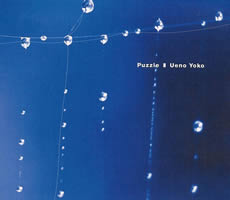
Image © Victor Entertainment (Japan) 2002
|
|
(17 August 2003) It may have been Karl Jenkins of Adiemus (reviews 1,2,3) who was the first composer that succeeded worldwide by writing songs with totally phonetical and purely meaningless lyrics, and it seems to be a creating a method which other composers have taken on. This is also the case with Yoko Ueno, an outstanding, rising singer-songwriter from Japan, and particularly her album Puzzle (Victor Entertainment (Japan) VICL 60821, 2002). Prior to hearing this album, I had never heard Yoko Ueno's music nor anything about her other musical things, though I have been listening to some other Japanese female crossover artists (Eri Sugai (review) and her project Stella Mirus (review) as well as Eri Kawai) whose music are similar than Yoko Ueno's. Each of these artists do use more or less made-up, invented languages as well as multi-tracking of the voices, and although some listeners could state that their music is too similar to each other, I think that it isn't so at all. The album starts off with "Slither Link," a wonderful Asian-flavoured piece with synthesized percussion after an a cappella introduction. The piece draws influences quite heavily from Karl Jenkins's Adiemus compositions, both rhythmically and melodically, reminding me very much of his song "Beyond The Century." The result is a very ear-friendly piece, and I bet that the refrain is very easily hummable because it is so catchy! "Maze" is a more meditative and serene one, although the beginning of it features some modern tonality. Toying with the human voice and other instruments made me to ask "what's next?", but I mean it only in a positive way. Irish music fans like myself may find the usage of the Uilleann pipes very interesting in here. "Polyomino" is mainly based on vocalise. The multi-tracking brings the piece into yet further dimensions, and gives the listener a great amount of sudden understanding about how human voices can really be used in music. What a composition and a performance! "Seek Wards" then is a very ear-pleasant piece, maybe because of its simple and flowing melody and minimalistic accompaniment. Yoko Ueno may certainly have not heard any music from the debut album of Finnish group ZetaBoo, but somehow I was able to hear very many things in common with a certain ZetaBoo (review) piece, namely "Maria"! A real delicacy for everyone's ears. In addition to Asian and Celtic flavours, there are also some mediaeval influences which have been finely cultivated in "MacMahon." A pulsing rhythm and the usage of a recorder-like reed instrument fits like a glove. The harpsichord and Yoko's singing completes it all, and the finger cymbals give some Asian flavour in as well. In "Sumcross" multi-tracking has been used and. rhythmically thinking, all the voices form a complex structure. The track "Tower of Hanoi", oddly transfers my thoughts into totally different place, namely, somehow the singing style of this song reminds me very strongly about Lapland and the Sámi singing style also known as the yoik. The Sámi people use similarly overlapped vocals, harmonies and rhythmical drumbeats in their yoik, and because yoik music is nowadays quite well-known outside Lapland as well, I think that the influences have become very universally used indeed. "Flexagons" represents the melancholic side of this album, being quite slow and written into a minor key. I don't like is the "heavy" percussion synthesizer sounds that are present throughout the song, but other listeners can say that they suit to the piece. "Number Place" may have something in common with Karl Jenkins's Adiemus music. Whereas Karl's "Chorale VI - Sol-Fa" from Adiemus II Cantata Mundi is based on the musical names of the intervals (named by a Hungarian composer Zoltán Kodály), the lyrics of this piece probably are the notes of the scale. The overlapping of the voices makes the piece interesting, and although the melody is quite modern in terms of tonality, it simultaneously glues the listener to his/her place without letting one to pause the listening. Hypnotizing. "Shmuzzle" is a very interesting piece that brings the listener back to softer moods with a solo voice, percussion, acoustic guitar, the Uilleann pipes and synthesizers, which perform a probable lullaby. Lullaby indeed, though somewhere in the middle the piece grows into a moderate-tempo dance. A great mixture of Celtic and other world music influences, which nearly reminds about some instrumental pieces of Secret Garden (reviews 1, 2). "Tangram" is very peaceful number, and as the title indicates it has included some Japanese influences. Yoko Ueno's voice is multi-tracked, and in addition she uses typical Asian melismatic passages as well as the pentatonic (5-note) scales. The middle section of the piece reminds hugely the style of Adiemus again, with repeated triplet rhythm patterns, similar harmonies, lyrical style and the use of percussion instruments. "Tic-Tac-Toe" concludes the album. It is a fast and quite tribal-sounding song with some imitation of vocal drums and fair amount of scat singing. Some listeners may find the piece too modern in terms of tonality, but for me it was a very exciting experience. The most surprising thing on this album is, that although there are so many different influences drawn from many (musical) cultures, it doesn't make the album's pieces too diverse. Therefore it's a big pity that Yoko Ueno's music is not so well-known outside Japan, since at least this album would interest many non-Asian people as well. It is a must listen for any serious crossover music enthusiast.--Suvi Kaikkonen
|




